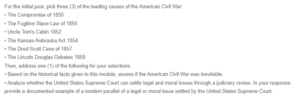Stepping Stones to the Civil War
Assessing if the Civil War Was Inevitable
Various reasons have been attributed to causing the Civil War, but the main attribute that played a central role was slavery. In the 19th century, the North was well established in manufacturing and industries, while agriculture was only small-scale (Ransom 1989). On the other hand, the South’s economy was dependent on large-scale farming, which was reliant upon the labor of enslaved people. In the 1830s, abolitionist sentiment grew in the North, and its resistance to slavery began stretching out into the new Western regions, which led the South to fear the end of slavery and, thus, the foundation of their economy (Ransom 1989). Do you need any help for completing your assignment ? Contact us at eminencepapers.com. We endeavor to provide you with excellent service.
In the year 1850, U.S. Congress passed a revised version of the Fugitive Slave Act, succeeding from rising pressure from South States politicians. This Act was a section of the Henry Clay Compromise that was passed in the same year. The Compromise was a collection of proposed laws that assisted in early calls for the withdrawal of the South (Foner 2011)). Additionally, the Act forcefully compelled individuals to help in capturing escaped enslaved people, denied the enslaved individuals the entitlement to a jury trial, and raised the punishment for interfering with the handing-over process. Enforcing the Fugitive Act was faced with more opposition from the North than the Compromise was, and the Northern States even passed new laws to nullify and bypass the Act. Furthermore, abolitionists increased their efforts to help the runaways.
In the 1850s, Congress passed the Kansas-Nebraska Act, opening the new western domains to servitude, and to oppose the Act, the North formed the Republican Party (Foner 2011). The Republican Party’s principle was to oppose slavery extension into the newly procured West. When Abraham Lincoln, a heavy opposer to slavery, was elected in 1860, it marked the last straw for the Southern states. Seven states from the South seceded from the U.S. and later were joined by three more (Foner 2011). The Civil War started in 1861 as Abraham Lincoln took office, and the Confederate forces attacked Fort Sumter in Charleston. The war lasted for four years till 1865 when the North won.
In conclusion, with the South hell-bent on enforcing slavery for their survival and the North constantly fighting for the freedom and rights of the slaves, the two sides were complete opposites. The South formed Confederate armies whose aim was to preserve slavery, while the North, with Abraham Lincoln as President, fought to end slavery. The conflict between these two sides made the Civil War inevitable.
References
Ransom, R. L. (1989). Conflict and Compromise: the political economy of slavery, emancipation, and the American Civil War. Cambridge University Press.
Foner, E. (2011). The Civil War and slavery a response. Historical Materialism, 19(4), 92-98.
ORDER A PLAGIARISM-FREE PAPER HERE
We’ll write everything from scratch
Question

Stepping Stones to the Civil War
For the initial post, pick three (3) of the leading causes of the American Civil War:
• The Compromise of 1850
• The Fugitive Slave Law of 1850
• Uncle Tom’s Cabin 1852
• The Kansas-Nebraska Act 1854
• The Dred Scott Case of 1857
• The Lincoln Douglas Debates 1858
Then, address one (1) of the following for your selections:
• Based on the historical facts given in this module, assess if the American Civil War was inevitable.
• Analyze whether the United States Supreme Court can settle legal and moral issues through a judiciary review. In your response, provide a documented example of a modern parallel of a legal or moral issue settled by the United States Supreme Court.

